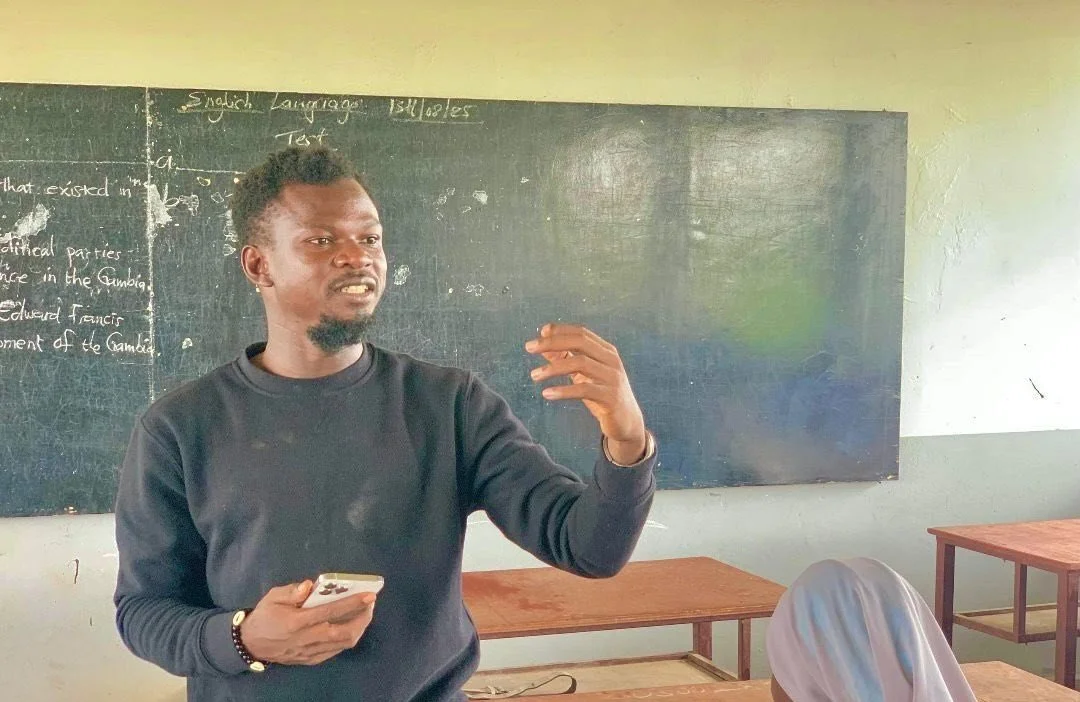Justice Minister says “Government is Willing to Discuss on Public Order Act”
GALA Spokesperson Camara and Justice Minister Jallow © Askanwi
By Edward Francis Dalliah and Yusef Taylor
Justice Minister, Hon Dawda A. Jallow conceded to public concerns after the Spokesperson of Gambians Against Looted Assets (GALA) challenged him to amend draconian sections of the Public Order. The Justice Minister and at least seven other ministers held a press conference responding to petitions from GALA on Friday, 29th August 2025, after police cracked down on some 23 protestors arrested on 22nd and 23rd August 2025.
The arrests and ongoing prosecution have stirred public debate over Section 5 of the Public Order Act, which the National Human Rights Commission (NHRC) and civil society advocates have renewed calls for the government to comprehensively review and amend. Their call is to change from a permit requirement to a notification procedure for protests using processions and loudspeakers.
The Justice Minister was responding to GALA Spokesperson Omar Saibo Camara’s concerns “that protest or peaceful assembly is a fundamental human right, so any other law or bylaw must not be used to censor it.” Camara added a rallying call for the government to “amend the Public Order Act. Let’s work on that; let the dialogue start from there.”
Hon. Jallow explained that the “government is willing to talk about this. [On] anything there can be dialogue. Nothing is off the table. As long as we are talking, we can talk. How do we even amend it? What do we amend? What do we agree to disagree [on]? These things can form part of the dialogue.”
Minister Jallow added that “nobody is saying it cannot be discussed. But if we have to discuss, we have to discuss from a frank point of view. You cannot tell me something is illegal that I know is not illegal. Just because I want to dialogue with you.”
Justice Minister Hon Dawda Jallow © Askanwi
After reviewing the press conference, it was observed that at least three individuals asked questions on the Public Order Act. However, none of them questioned the illegality of the draconian sections of the Public Order Act.
The first question highlighted by a journalist questioned the government’s commitment to reform the Public Order Act, which was instituted during the Colonial days.
In response, Justice Minister Jallow explained that there are many “Colonial Legislation that we inherited”, and “yes, the Public Order Act is one of them. It has been challenged, and we commend Civil Society. It was challenged at the ECOWAS Community Court by some Gambians to declare some aspects of the Public Order Act as a violation of the African Charter on Human and People’s Rights”.
However, “the ECOWAS Community Court delivered a different judgement; they disagreed, and they said it is not against the African Charter on Human and People’s Rights,” said Minister Jallow. He added that the Public Order Act was also challenged at the Supreme Court “and the Supreme Court again said the Public Order Act is not unconstitutional. So, the legality or the constitutionality of the Public Order Act is settled.”
To address the gap between civil society advocates and the government, the Justice Minister noted that “now, whether we want to maintain it in our laws or we want to remove it, this is an ongoing dialogue, and the government is free to be engaged in this discussion – that’s what I can say.”
GALA Spokesperson Omar Camara
But the concerns raised were not regarding the illegality of the Public Order Act. The concerns raised focused on the government’s multiple promises to reform the Public Order Act.
Following up on this question, another journalist questioned the Justice Minister about the government’s promises to reform the Public Order Act via its Coalition 2016 Manifesto and the Truth, Reconciliation, and Reparations Commission’s (TRRC) recommendations.
Our research revealed that the Coalition 2016 Manifesto noted that the “Public Order Act, Laws of The Gambia 2009, gives too much power to the Inspector General of Police and does fetter freedom of association and assembly.” To address this, "the Coalition government will repeal any provision in the Public Order Act that is not reasonable and justifiable in a democratic society, such as those that hinder peaceful procession to highlight public grievances, which is the main tool for exercising civil society oversight over the governance process.”
Six years later the government renewed its pledge after the TRRC recommended “a comprehensive review of the Public Order Act by the National Assembly with a view to amending it to be in line with international human rights instruments and customary standards.”
In response, the government accepted “the recommendation of the Commission and [pledged to] initiate a review of the Public Order Act.” However, nine years on, none of these promises have been fulfilled.
When challenged with these facts, Justice Minister Jallow stated that “the legislative reform agenda of this government is huge, and those of you who follow the development in the National Assembly will see the volume of legislations that are being submitted every session in the National Assembly. So, we have a very ambitious legislative agenda, but this is a process, so it is an ongoing one.”
After the questions and answers from journalists, that’s when the GALA spokesperson chimed in to hold the government accountable.



